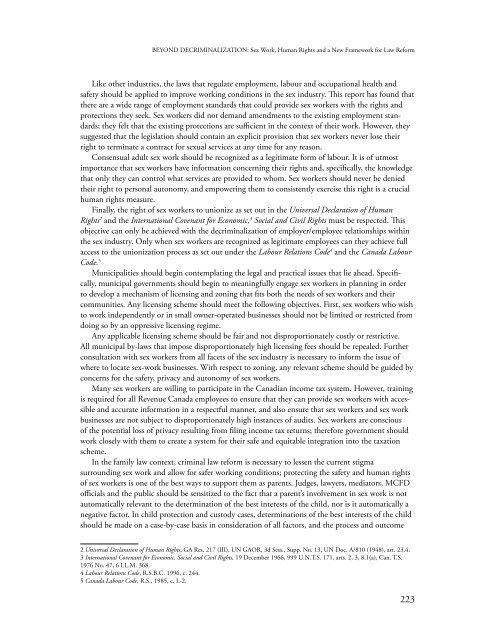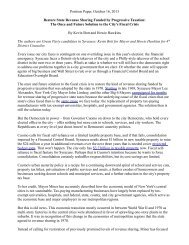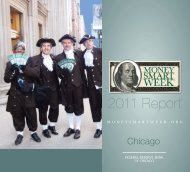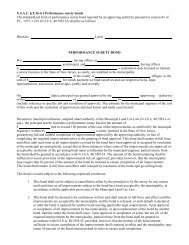Beyond Decriminalization: Sex-work, Human Rights and a New ...
Beyond Decriminalization: Sex-work, Human Rights and a New ...
Beyond Decriminalization: Sex-work, Human Rights and a New ...
- No tags were found...
You also want an ePaper? Increase the reach of your titles
YUMPU automatically turns print PDFs into web optimized ePapers that Google loves.
BEYOND DECRIMINALIZATION: <strong>Sex</strong> Work, <strong>Human</strong> <strong>Rights</strong> <strong>and</strong> a <strong>New</strong> Frame<strong>work</strong> for Law ReformLike other industries, the laws that regulate employment, labour <strong>and</strong> occupational health <strong>and</strong>safety should be applied to improve <strong>work</strong>ing conditions in the sex industry. This report has found thatthere are a wide range of employment st<strong>and</strong>ards that could provide sex <strong>work</strong>ers with the rights <strong>and</strong>protections they seek. <strong>Sex</strong> <strong>work</strong>ers did not dem<strong>and</strong> amendments to the existing employment st<strong>and</strong>ards;they felt that the existing protections are sufficient in the context of their <strong>work</strong>. However, theysuggested that the legislation should contain an explicit provision that sex <strong>work</strong>ers never lose theirright to terminate a contract for sexual services at any time for any reason.Consensual adult sex <strong>work</strong> should be recognized as a legitimate form of labour. It is of utmostimportance that sex <strong>work</strong>ers have information concerning their rights <strong>and</strong>, specifically, the knowledgethat only they can control what services are provided to whom. <strong>Sex</strong> <strong>work</strong>ers should never be deniedtheir right to personal autonomy, <strong>and</strong> empowering them to consistently exercise this right is a crucialhuman rights measure.Finally, the right of sex <strong>work</strong>ers to unionize as set out in the Universal Declaration of <strong>Human</strong><strong>Rights</strong> <strong>and</strong> the International Covenant for Economic, Social <strong>and</strong> Civil <strong>Rights</strong> must be respected. Thisobjective can only be achieved with the decriminalization of employer/employee relationships withinthe sex industry. Only when sex <strong>work</strong>ers are recognized as legitimate employees can they achieve fullaccess to the unionization process as set out under the Labour Relations Code <strong>and</strong> the Canada LabourCode. Municipalities should begin contemplating the legal <strong>and</strong> practical issues that lie ahead. Specifically,municipal governments should begin to meaningfully engage sex <strong>work</strong>ers in planning in orderto develop a mechanism of licensing <strong>and</strong> zoning that fits both the needs of sex <strong>work</strong>ers <strong>and</strong> theircommunities. Any licensing scheme should meet the following objectives. First, sex <strong>work</strong>ers who wishto <strong>work</strong> independently or in small owner-operated businesses should not be limited or restricted fromdoing so by an oppressive licensing regime.Any applicable licensing scheme should be fair <strong>and</strong> not disproportionately costly or restrictive.All municipal by-laws that impose disproportionately high licensing fees should be repealed. Furtherconsultation with sex <strong>work</strong>ers from all facets of the sex industry is necessary to inform the issue ofwhere to locate sex-<strong>work</strong> businesses. With respect to zoning, any relevant scheme should be guided byconcerns for the safety, privacy <strong>and</strong> autonomy of sex <strong>work</strong>ers.Many sex <strong>work</strong>ers are willing to participate in the Canadian income tax system. However, trainingis required for all Revenue Canada employees to ensure that they can provide sex <strong>work</strong>ers with accessible<strong>and</strong> accurate information in a respectful manner, <strong>and</strong> also ensure that sex <strong>work</strong>ers <strong>and</strong> sex <strong>work</strong>businesses are not subject to disproportionately high instances of audits. <strong>Sex</strong> <strong>work</strong>ers are consciousof the potential loss of privacy resulting from filing income tax returns; therefore government should<strong>work</strong> closely with them to create a system for their safe <strong>and</strong> equitable integration into the taxationscheme.In the family law context, criminal law reform is necessary to lessen the current stigmasurrounding sex <strong>work</strong> <strong>and</strong> allow for safer <strong>work</strong>ing conditions; protecting the safety <strong>and</strong> human rightsof sex <strong>work</strong>ers is one of the best ways to support them as parents. Judges, lawyers, mediators, MCFDofficials <strong>and</strong> the public should be sensitized to the fact that a parent’s involvement in sex <strong>work</strong> is notautomatically relevant to the determination of the best interests of the child, nor is it automatically anegative factor. In child protection <strong>and</strong> custody cases, determinations of the best interests of the childshould be made on a case-by-case basis in consideration of all factors, <strong>and</strong> the process <strong>and</strong> outcome Universal Declaration of <strong>Human</strong> <strong>Rights</strong>, GA Res. 217 (III), UN GAOR, 3d Sess., Supp. No. 13, UN Doc. A/810 (1948), art. 23.4. International Covenant for Economic, Social <strong>and</strong> Civil <strong>Rights</strong>, 19 December 1966, 999 U.N.T.S. 171, arts. 2, 3, 8.1(a), Can. T.S.1976 No. 47, 6 I.L.M. 368. Labour Relations Code, R.S.B.C. 1996, c. 244. Canada Labour Code, R.S., 1985, c. L-2.223
















